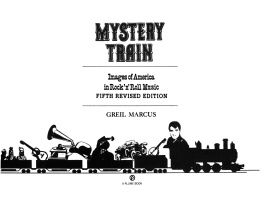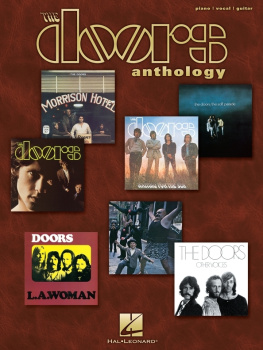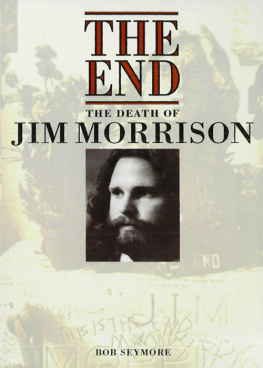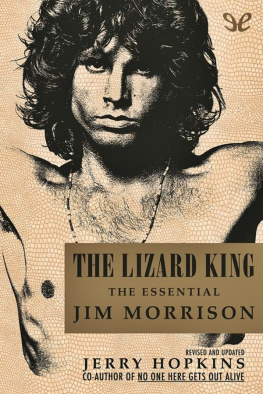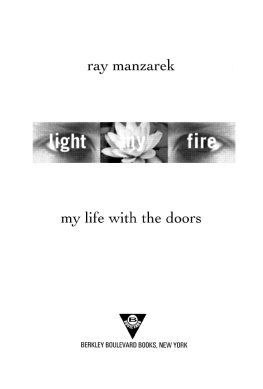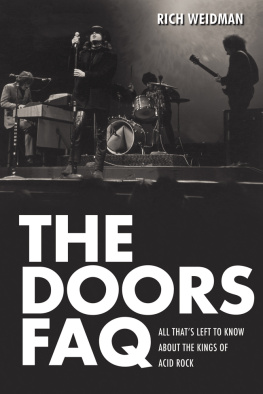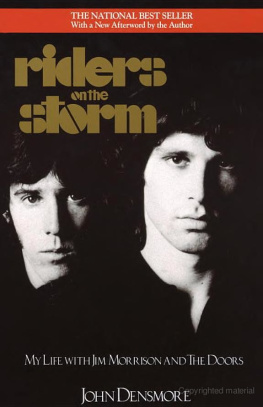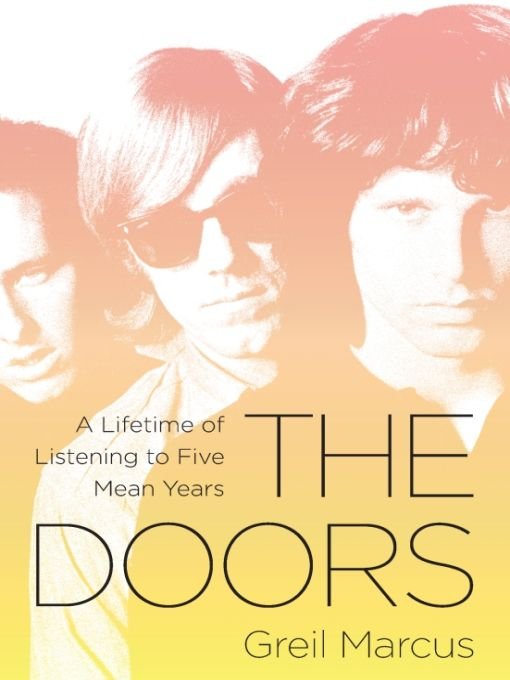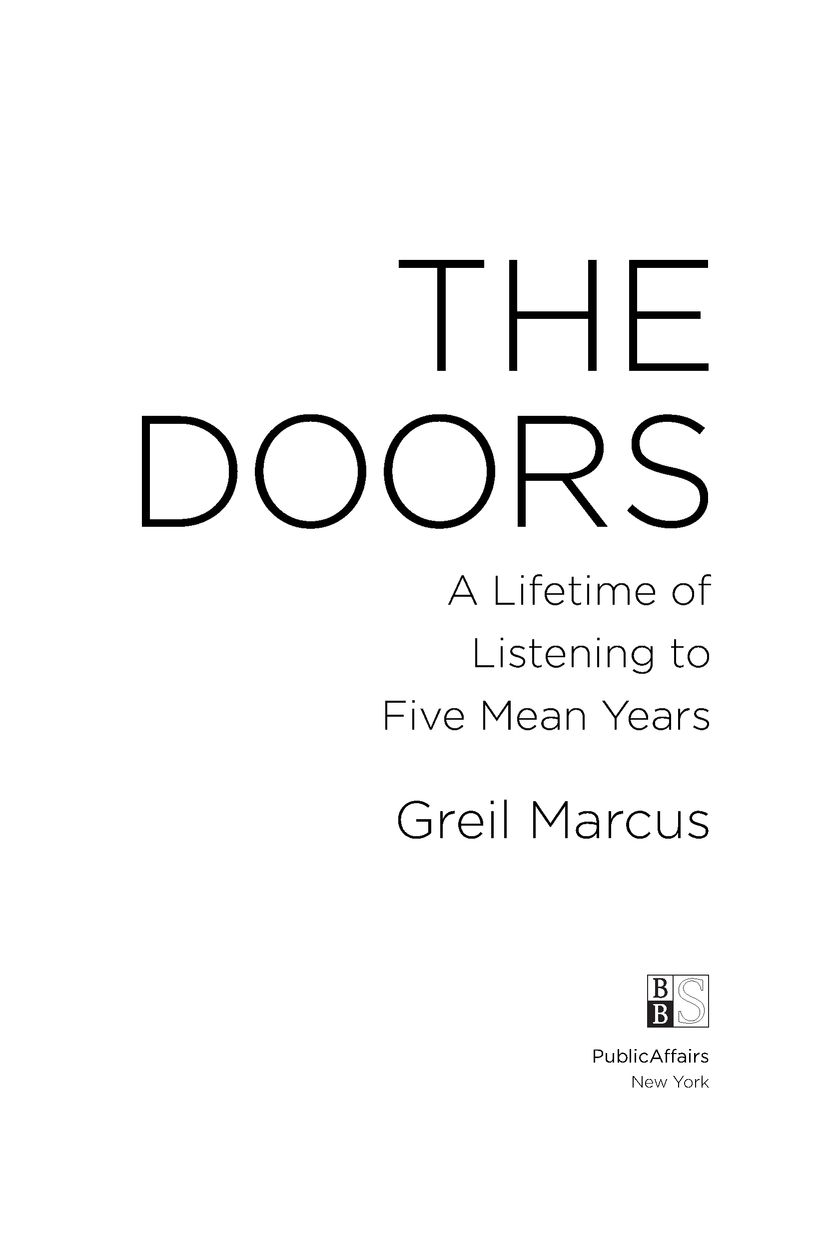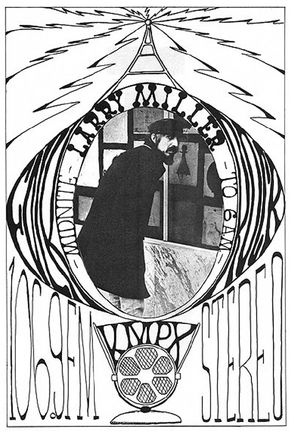Table of Contents
ALSO BY GREIL MARCUS
Mystery Train: Images of America in Rock n Roll Music (1975, 2008)
Lipstick Traces: A Secret History of the 20th Century (1989, 2009)
Dead Elvis: A Chronicle of a Cultural Obsession (1991)
In the Fascist Bathroom: Punk in Pop Music, 197792
(1993, originally published as Ranters & Crowd Pleasers)
The Dustbin of History (1995)
The Old, Weird America: The World of Bob Dylans Basement Tapes
(2000, 2011, originally published as Invisible Republic, 1997)
Double Trouble: Bill Clinton and Elvis Presley in a Land
of No Alternatives (2000)
The Manchurian Candidate (2002)
Like a Rolling Stone: Bob Dylan at the Crossroads (2005)
The Shape of Things to Come: Prophecy and the American Voice (2006)
When that Rough God Goes Riding: Listening to Van Morrison (2010)
Bob Dylan by Greil Marcus, Writings 19682010 (2010)
AS EDITOR
Stranded (1979, 2007)
Psychotic Reactions & Carburetor Dung by Lester Bangs (1987)
The Rose & the Briar: Death, Love and Liberty in the American Ballad
(2004, with Sean Wilentz)
Best Music Writing 2009 (2009)
A New Literary History of America (2009, with Werner Sollors)
TO LARRY MILLER
THE DOORSRay Manzarek, born 1939, Jim Morrison, 1943, John Densmore, 1944, and Robby Krieger, 1946formed in Venice, a Southern California beach town, in 1965. They started out at parties, weddings, and high-school proms, and played their last show on December 12, 1970, at the Warehouse in New Orleans. Jim Morrison died in Paris on July 3, 1971.
JIM MORRISON: Interviews are good, but...
GREG SHAW: Oh, theyre a drag.
JIM MORRISON: Critical essays are really where its at.
Interview with the Doors,
Mojo Navigator Rock + Roll News
no. 14, August 1967
Prologue:
Light My Fire, 1967
BY SEPTEMBER 30, 1967, when the Doors appeared at the Family Dog in Denveran outpost of the Avalon Ballroom in San Francisco, where the band had played often in the first months of the yearLight My Fire had already reached number one all over the country. In fact it had stolen the year, at first the nearly seven minutes of the song creeping out of the night on the few, new FM rock n roll stations that still seemed more rumor than fact, then in a cut-down, three-minute version taking over AM Top 40 stations everywhere, sending their listeners into the record stores or in search of FM if they could find it, to hear the whole song, or to the phones to demand that the AM disc jockeys play it all, which soon enough they did.
This night in Denver it was a fair bet that everyone in the hall had already heard the thing at least four or five hundred times. The Doors had already played it for more than a year, from the nowhere London Fog club off Sunset Strip in Los Angeles to the celebrated Whisky Go Go on it and at every show after that. They played it before anyone had heard of them; they played it until well after the name of the band was on so many lips that, more than forty years past the singers death, after he had been dead for far more years than he had been alive, the name of the band still struck a chord. It wasnt a chord of memory. It was a note of possibility, of promises made that still remained to be kept, promises that in life were inevitably failed and in the music left behind were kept over and over again.
We really didnt see it coming, the new world of rabid individualism and the sanctity of profit, the British novelist Jenny Diski wrote in 2009. But perhaps that is only to be expected. Its possible after all that we were simply young, and now we are simply old and looking back as every generation does nostalgically to our best of times. Perhaps the Sixties are an idea that has had its day and lingers long after its time. Except, of course, for the music.
There were, of course, those, the great majority, doubtless, who, having finished with their wild youth, put on proper suits come the mid-Seventies and went off to work and a regular life, becoming all their parents could have wished, having just gone through a phase, as the more liberal of the grown-ups had always suggested. But somethese days called, derogatorily, idealistsmaintained their former sense that society exists, and believe it persists, even beyond the strident years of Margaret Thatcher and the official approved decades of self-interest and greed that have followed. We are the disappointed remnant, the rump of the Sixties.
But that drama was already taking place only two months after Light My Fire hit the top of the charts.
How do we make this song into something they havent heard before? How do we make it into something we havent heard before?
On September 30 theres a lift in Jim Morrisons voice for the first two times he reaches the word fire in each chorus, as if running his hands over the single syllablealways, he communicates that as an idea that word is new to him, and so it comes across as a surprise. Youve heard the word in the song, but you havent begun to follow that fire as far as it goesthats the feeling. Fireits a door swinging open in the wind, seen from a distance.
Compared to the first two times the word is sung on record, the third timeFY-YUR! is vulgar, a hook, something to wake you up if the song has already put you to sleep. But tonight, in the first chorus, Morrison stays with the word as he first sang it: Fire... fiiire... fiiiiire. He holds the word up to the light, looking at it from all sides, still letting it float in the air. Light my fire was already a clich, a tired catchphrase by September; within a year it would be a teen-sex poster and a worldwide easy-listening hit by Jose Feliciano, in two years a porn movie. Now, as the song starts, the word fire seems like a strange thing to say, less a word than a rayograph.
The recording from this night is from a bootleg, the sound squeezed into itself. Robby Kriegers guitar and Ray Manzareks organ can seem like the same instrument. But John Densmores drumming is always defined, each beat feeling like a choice made, sealed, and left behind. Morrisons voice floats over the band, even when he seems to be shouting from far behind itshouting encouragement, as if the song as it builds isnt enough, isnt yet itself


